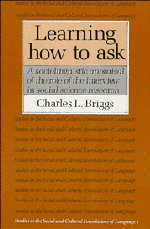 Learning How to Ask
Learning How to Ask Book contents
- Frontmatter
- Contents
- Foreword by Aaron V. Cicourel
- Preface
- 1 Introduction
- 2 The setting: Mexicano society and Córdova, New Mexico
- 3 Interview techniques vis-à-vis native metacommunicative repertoires; or, on the analysis of communicative blunders
- 4 The acquisition of metacommunicative competence
- 5 Listen before you leap: toward methodological sophistication
- 6 Conclusion: theoretical quagmires and “purely methodological” issues
- Notes
- References
- Index
5 - Listen before you leap: toward methodological sophistication
Published online by Cambridge University Press: 05 June 2012
- Frontmatter
- Contents
- Foreword by Aaron V. Cicourel
- Preface
- 1 Introduction
- 2 The setting: Mexicano society and Córdova, New Mexico
- 3 Interview techniques vis-à-vis native metacommunicative repertoires; or, on the analysis of communicative blunders
- 4 The acquisition of metacommunicative competence
- 5 Listen before you leap: toward methodological sophistication
- 6 Conclusion: theoretical quagmires and “purely methodological” issues
- Notes
- References
- Index
Summary
I must admit to having painted a critical picture of the state of interviewing in the sdcial sciences and linguistics. I initiated the discussion by pointing to a number of serious flaws in the literature on interviewing and by relating the persistence of crucial theoretical problems to a lack of methodological sophistication. Chapter 3 pointed to some of the procedural problems that can impede interviewing and can create serious problems in analyzing the data. I argued in Chapter 4 that native metacommunicative routines can inform the use of interview techniques in a given culture as well as provide precisely the types of data that are crucial for many problems in social scientific research.
It would thus be far from surprising if the reader were to have gained the impression that I am attempting to convince researchers to stop interviewing altogether. Indeed I am not. Interviews are highly useful tools for exploring a host of problems. As noted in Chapter 1, the theoretical and methodological insights that have emerged from such fields as the ethnography of communication, conversational analysis, language acquisition research, and other fields have provided us with the skills necessary for conducting and analyzing interviews in a more appropriate fashion.
Similarly, I am not arguing that greater methodological sophistication can only be gained through becoming a sociolinguist or at least developing more interest in the communicative dimensions of the interview than in the problems under study.
- Type
- Chapter
- Information
- Learning How to AskA Sociolinguistic Appraisal of the Role of the Interview in Social Science Research, pp. 93 - 111Publisher: Cambridge University PressPrint publication year: 1986


